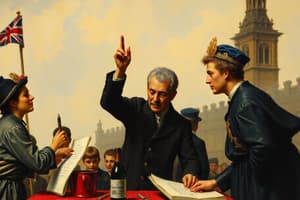Podcast
Questions and Answers
What were the primary catalysts for the calls for democratic reforms in Britain and France during the period described in the text?
What were the primary catalysts for the calls for democratic reforms in Britain and France during the period described in the text?
- The increasing influence of the Church and its advocacy for social justice and political reform.
- The growth of nationalism and the desire for self-determination in various regions.
- The expansion of the middle class and the rise of the working class, leading to demands for increased political representation.
- The burgeoning industrialization and urbanization, with their accompanying social problems, which prompted demands for changes in governance and worker protections. (correct)
Based on the text, what was one of the key demands of the reformers during this pivotal period in Britain and France?
Based on the text, what was one of the key demands of the reformers during this pivotal period in Britain and France?
- The creation of strong social welfare programs to alleviate poverty and unemployment.
- The expansion of the right to vote, specifically calling for extending suffrage to previously excluded groups. (correct)
- The establishment of independent judicial branches to ensure fairness and transparency in the legal system.
- The establishment of a free and independent press to curb government censorship and promote public discourse.
What were the main reasons why people during this era sought political reforms?
What were the main reasons why people during this era sought political reforms?
- They wanted to establish a system of social equality and ensure that all citizens had equal rights and privileges.
- They desired to improve the lives of workers and the poor, improve social conditions, and give more people a voice in government. (correct)
- They aimed to limit the power of the monarchy and establish a more democratic form of government.
- They sought to increase the influence of the aristocracy and ensure their continued dominance in government.
The text suggests that the transformation of Britain and France into the democracies they are today was driven by:
The text suggests that the transformation of Britain and France into the democracies they are today was driven by:
What does the text imply about the relationship between social problems and the demand for political reform?
What does the text imply about the relationship between social problems and the demand for political reform?
Which of these is NOT mentioned in the text as a factor contributing to the democratic reforms in Britain and France?
Which of these is NOT mentioned in the text as a factor contributing to the democratic reforms in Britain and France?
What inference can be drawn from the text about the connection between the rise of the middle class and the demand for democratic reforms?
What inference can be drawn from the text about the connection between the rise of the middle class and the demand for democratic reforms?
What is the most likely reason why the text mentions Britain becoming a constitutional monarchy in the late 1600s?
What is the most likely reason why the text mentions Britain becoming a constitutional monarchy in the late 1600s?
What was the primary change brought about by the legislation passed in 1999 regarding the House of Lords?
What was the primary change brought about by the legislation passed in 1999 regarding the House of Lords?
Which group first demanded a greater voice in British politics in the early 1800s?
Which group first demanded a greater voice in British politics in the early 1800s?
What were the property requirements like before the Reform Bill of 1832?
What were the property requirements like before the Reform Bill of 1832?
What was a significant reason for the passage of the Reform Bill of 1832?
What was a significant reason for the passage of the Reform Bill of 1832?
What limitation existed for voters in the early 1800s in Britain?
What limitation existed for voters in the early 1800s in Britain?
Which aspect of the Reform Bill of 1832 was aimed at ensuring better representation?
Which aspect of the Reform Bill of 1832 was aimed at ensuring better representation?
What historical event influenced parliamentary leaders to act in favor of the Reform Bill of 1832?
What historical event influenced parliamentary leaders to act in favor of the Reform Bill of 1832?
What proportion of the population had the right to elect members of the House of Commons prior to reforms?
What proportion of the population had the right to elect members of the House of Commons prior to reforms?
Which group was notably excluded from voting before the reforms in Britain?
Which group was notably excluded from voting before the reforms in Britain?
What is one of the implications of the reforms that began in 1830 regarding voting rights?
What is one of the implications of the reforms that began in 1830 regarding voting rights?
Flashcards
House of Lords
House of Lords
Upper house of the British Parliament, with appointed and hereditary members.
House of Commons
House of Commons
Lower house of the British Parliament, made up of elected officials.
Reform Bill of 1832
Reform Bill of 1832
Legislation that expanded voting rights and modernized parliamentary election districts.
Suffrage
Suffrage
Signup and view all the flashcards
Hereditary peers
Hereditary peers
Signup and view all the flashcards
Voting restrictions in early 1800s
Voting restrictions in early 1800s
Signup and view all the flashcards
Wealthy middle class
Wealthy middle class
Signup and view all the flashcards
Expansion of democracy
Expansion of democracy
Signup and view all the flashcards
Limited representation
Limited representation
Signup and view all the flashcards
Parliament
Parliament
Signup and view all the flashcards
Democratic Reform
Democratic Reform
Signup and view all the flashcards
Activism
Activism
Signup and view all the flashcards
Chartist Movement
Chartist Movement
Signup and view all the flashcards
Third Republic
Third Republic
Signup and view all the flashcards
Dreyfus Affair
Dreyfus Affair
Signup and view all the flashcards
Anti-Semitism
Anti-Semitism
Signup and view all the flashcards
Urbanization
Urbanization
Signup and view all the flashcards
Industrialization
Industrialization
Signup and view all the flashcards
Constitutional Monarchy
Constitutional Monarchy
Signup and view all the flashcards
Study Notes
Democratic Reform and Activism
- Urbanization and industrialization led to calls for improved worker and poor people's conditions. Many demanded a greater voice in government.
- These groups including the middle class, workers, and women advocated for voting rights for excluded groups.
- Britain became a constitutional monarchy in the late 1600s. Parliament, consisting of the House of Lords and House of Commons, was the real power center.
- The House of Commons members were elected by British people, but only a small percentage of males (about 5%) had the right to vote in the early 1800s. Land ownership was a prerequisite.
British Enacts Reforms
- The Reform Bill of 1832 addressed the demand from the middle class for voting rights, eased property requirements for voting, and gave the industrial cities more representation.
- The Chartist Movement, advocating for voting rights for all men, sought a secret ballot, an end to property requirements for serving in Parliament, and pay for members.
Women Get the Vote
- Multiple efforts by women in the US and Great Britain led to the fight for women's suffrage in the 1800s. Initially peaceful protests, their efforts developed into more active/militant means.
France and Democracy
- In the late 1800s, the Third Republic in France emerged, which was characterized by significant political uncertainty.
- The Dreyfus Affair, a military and political scandal involving a Jewish army officer, heightened anti-Semitism and highlighted divisions within French society.
Self-Rule for British Colonies
- Britain established colonies in Africa and Asia, but their power was limited to trade with local populations.
- Canada, Australia, and New Zealand underwent significant development and became stronger, leading to demands for self-rule.
- Canada was originally inhabited by Native American peoples, with early French colonists who intermarried with them.
- Disputes between French and English-speaking colonist over issues like religious beliefs and political representation led to the division of Canada into Upper and Lower Canada.
The Irish Win Home Rule
- English expansion into Ireland started centuries ago.
- The Great Famine, a severe potato blight in the 1840s, caused widespread starvation and emigration from Ireland.
- Increased demands for home rule (local control) emerged in Ireland throughout the late 1800s, partially in response to British rule and the desire for greater self-determination.
Studying That Suits You
Use AI to generate personalized quizzes and flashcards to suit your learning preferences.




